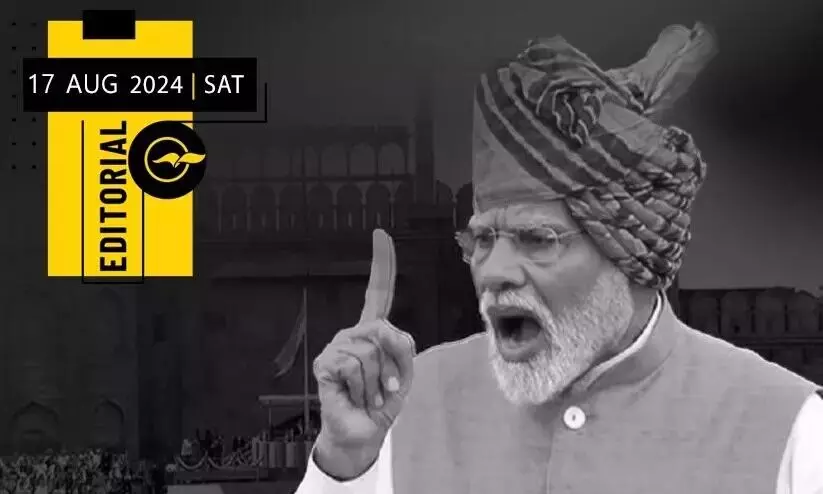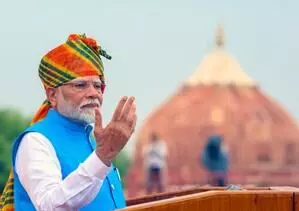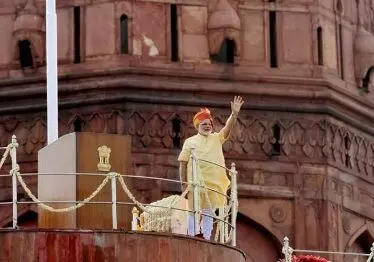
Empty rhetoric from the Red Fort again
text_fieldsOn the 78th Independence Day, Prime Minister Narendra Modi's address to the nation from the Red Fort proved, as usual, to be a display of meaningless assertions. This marked Modi's eleventh consecutive Independence Day speech. The 98-minute address was the longest in the 78-year history of such speeches. Before Modi, Prime Ministers' addresses from the Red Fort were concise, lasting less than an hour, and focused on pertinent issues. Over the past decade, however, the Red Fort's podium has increasingly become a platform for boastful assertions and, often, for hate campaigns. Last year's Independence Day speech was delivered amidst the turmoil in Manipur, where attackers, with the state's government's backing, were wreaking havoc.
Beyond the ornamental phrase "the nation stands with Manipur," the Prime Minister made no substantial mention of the issue. Moreover, he even went so far as to absolve the state government of any blame. In that speech, and in the subsequent Parliament session, Modi repeatedly asserted that he would become Prime Minister for a third time. During the election period, he also claimed that he would retain power by securing over 400 seats, further weakening the opposition. However, the election results did not favour him. To remain in power, the coalition partners must now be appeased. This is why coalition partners are being granted more benefits in the budget and other areas. Unlike before, it is now evident that the opposition cannot be ignored and sidelined, as the recent Parliament session demonstrated. Some changes have been generally observed as a result of this. Naturally, it was expected that these changes would be reflected in the Independence Day speech, which is also a platform for announcing government policies. However, not only did this not occur, but the Prime Minister also used the occasion to assert firmly that they would continue advancing their Hindutva agenda.
Since the Modi government came to power in 2014, the ruling party and the allied Hindutva forces have succeeded in creating the impression that a Uniform Civil Code could be implemented in the country at any moment. Towards the end of the second Modi government, several BJP-ruled states drafted and introduced bills related to this in their respective assemblies. Consequently, it was anticipated that if Modi secured a third term, the Uniform Civil Code would be the first item on the agenda. However, as mentioned earlier, the ruling party faced a setback in the elections. Under the current circumstances, the only way forward is to accommodate the coalition partners and their demands and agendas. Therefore, most post-election analyses suggested that the overt Hindutva agendas would be postponed for the time being. In his Independence Day speech, however, Modi sent a strong message that he would not retreat from such agendas.
Modi asserted that the existing personal laws are 'communal' and that 'secular' civil laws are therefore necessary. He made it clear that they had introduced a secular common civil law and would proceed with its implementation. The speech also proclaimed that there would be no turning back from the decision of 'One Nation, One Election', which ensures the dominance of the Hindutva ideology. It is already evident that these ideas have the potential to undermine the constitutional values of the country, going beyond a mere government agenda. The opposition had hoped that thrugh the elections they could thwart the BJP's nefarious designs. However, the public declaration of advancing the agenda despite a reduced majority presents a new challenge for the opposition. In parliament they may be slightly thinned down, but the slogans of hate politics continue to dominate both inside and outside Parliament. This realisation may be the reason why opposition parties immediately came out with protests against Modi's statement.
There is very little for any one to take seriously in Modi's claims about economic reforms and the fight against corruption. These rhetorical exercises, which are far removed from current realities, can easily be debunked by the experiences of every Indian. The nation has yet to recover from the impact of the so-called economic reforms implemented by Modi. We are currently experiencing the highest unemployment rate in four decades. Even in the government sector, there have been no new recruitments.
According to parliamentary records, in the first eight years of Modi's rule, out of 22 crore applications for government jobs, only 750,000 people were appointed. In the last ten years, 300,000 positions were cut in the Central Information and Broadcasting ministry alone. In the public sector, only three out of a thousand applicants are securing jobs, according to statistics. Given this reality, the Prime Minister's claims that the country will achieve significant economic progress in the coming years cannot be regarded as factual. Even as the nation struggles in the depths of an economic woes, the government continues to indulge in divisive agendas, ignoring all such issues. The Prime Minister's Independence Day speech also serves as a reminder that, post-election, hate agendas continue to pose a challenge to the country.








